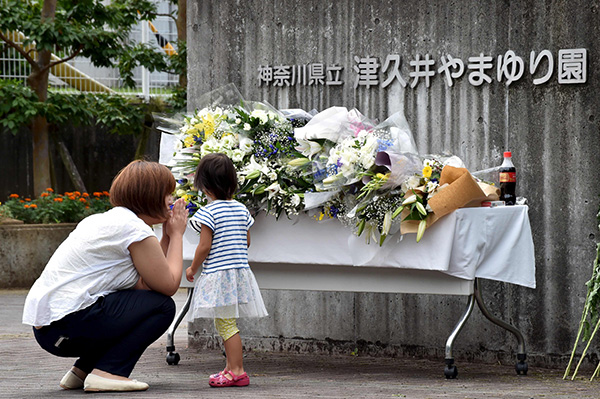
A mother and her daughter offer flowers for the victims of a knife rampage at the main entrance to the Tsukui Yamayuri En care centre in Sagamihara, Kanagawa prefecture on July 28. – AFP photo
THE Tsukui Yamayurien is a residential care facility for people with intellectual disabilities in the city of Sagamihara, Japan. In the early hours of July 26, 2016, 19 residents were ruthlessly killed and 26 others were injured, some with severe life-threatening wounds.
Shortly after the attack, 26-year-old Satoshi Uematsu, a former employee of the facility surrendered himself to the police. Bloodstained knives were found in the bag he was carrying. Two more knives, also bloodstained, were later found at the facility.
Investigators have deduced that the act was premeditated and systematic looking at how he had restrained staffers and the way he went about killing the residents. When questioned by investigators, Uematsu was reported to have said, “It is better that disabled people disappeared.” He added that he stabbed people who could not communicate with others.
There is a tremendous outpouring of grief from disabled people worldwide and also outrage asking how such an incident could have happened. This collective anger, frustration and confusion is understandable as we are bonded by similar experiences of discrimination and oppression although we are separated by distance and cultures.
It is difficult to come to terms with why someone would commit a crime of this magnitude. Newspapers in Japan called this the worst mass murder in Japan since World War Two. This is possibly the worst massacre of disabled people in the history of the modern era.
Words alone cannot sufficiently describe my emotions at this moment. I am personally affected by this tragedy. Japan has a special place in my heart because that was where I cut my teeth learning the various aspects of disability rights advocacy. I grieve along with my friends in Japan in this difficult time.
In a letter to the speaker of the Lower House in February 2016, Uematsu reportedly outlined his plan to kill residents of the facility and demanded laws authorising the euthanasia of disabled people be passed. The case was investigated by the police. He was admitted to the hospital for medical examination and released two weeks later.
It is alarming there are people who still hold on to the misguided mentality that disabled people are better off dead. Impairments are seen as an aberration of the “normal” human characteristics. They deem such lives are not worth living because of one deficit or another.
Those who were killed may be living with severe and multiple impairments but they have the same right to life as everyone else. Their life has the same value as anyone else’s. No one has the right to take that away from them.
It appears this line of thinking is not limited to certain cultures and societies. Even in developed countries where the disability rights movement is active and the social welfare system is established, there are pockets of people who feel the world is better off without disabled people.
Euthanasia should not be considered the option to help end the supposedly misery of disabled people. It will not make society more perfect. It is because diversity and difference is the order of nature. If anything, euthanasia will take us down a slippery slope that may not only end with disabled people.
A statement on this matter by the Japan National Assembly of Disabled Peoples’ International condemned the killings and affirmed the organisation’s commitment in fighting against acts “that questions the existence of persons with disabilities”. It also noted there were increased incidents of hate crimes and hate speech against disabled people, and there is a need to create an inclusive society free of such hatred.
In the wake of this tragedy, there is an urgent need to take proactive steps to protect disabled people, especially those living in institutions, from hate crimes, not only in Japan but globally. It is scary how easily we can be harmed. We are vulnerable because we often do not have the capability and means to defend ourselves. What is even scarier is that it only takes one person to perpetrate a carnage of this scale.
Advocates have a lot of work ahead, not only to clear prejudices and misconceptions towards disabled people but to bring forth the issues faced by people with severe impairments. They are the most marginalised within the community of disabled people as their voices are seldom heard. Society needs to realise people like this exist and establish programmes to support them in every way possible.
Please do not let this be a passing incident that temporarily tugs at our heartstrings which we will soon forget when another breaking news hits the headlines. There is a lesson to be learnt from this although I wished it was under different circumstances. This tragedy may have happened far from our shores but it could happen here if we are not serious in pushing the pertinent message across that disabled people have the same rights to live just like everyone else.
May the souls of those who died in Sagamihara rest in peace and may a tragedy as cruel as this never ever happen again. And may those who survived the attack recover speedily.
